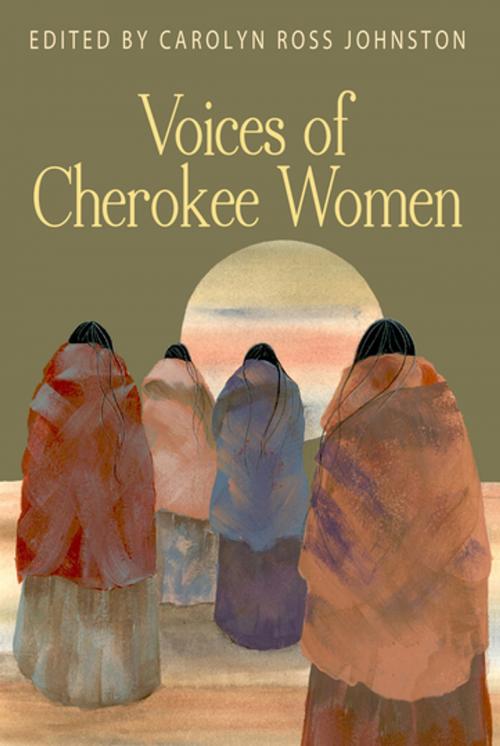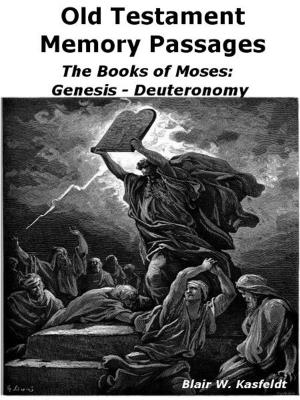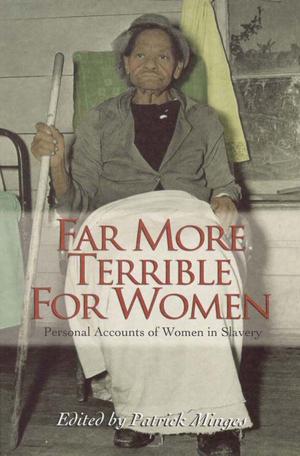| Author: | ISBN: | 9780895876003 | |
| Publisher: | Blair | Publication: | October 8, 2013 |
| Imprint: | Blair | Language: | English |
| Author: | |
| ISBN: | 9780895876003 |
| Publisher: | Blair |
| Publication: | October 8, 2013 |
| Imprint: | Blair |
| Language: | English |
Voices of Cherokee Women is a compelling collection of first-person accounts by Cherokee women. It includes letters, diaries, newspaper articles, oral histories, ancient myths, and accounts by travelers, traders, and missionaries who encountered the Cherokees from the 16th century to the present. Among the stories told by these “voices” are those of Rebecca Neugin being carried as a child on the Trail of Tears; Mary Stapler Ross seeing her beautiful Rose Cottage burned to the ground during the Civil War; Hannah Hicks watching as marauders steal her food and split open her feather beds, scattering the feathers in the wind; and girls at the Cherokee Female Seminary studying the same curriculum as women at Mount Holyoke. Voices of Cherokee Women recounts how Cherokee women went from having equality within the tribe to losing much of their political and economic power in the 19th century to regaining power in the 20th, as Joyce Dugan and Wilma Mankiller became the first female chiefs of the Cherokee Nation. The book’s publication was timed for the commemoration of the 175th anniversary of the Trail of Tears.
Carolyn Ross Johnston has a B.A. from Samford University and a Ph.D. in history from the University of California–Berkeley. Her previous publications Cherokee Women in Crisis: Removal, The Civil War, and Allotment, 1838-1907; Sexual Power: Feminism and the Family in America; Jack London: An American Radical; and My Father’s War: Fighting with the Buffalo Soldiers in World War II. A recipient of Woodrow Wilson and Danforth fellowships and a Pulitzer-prize nominee, Johnston teaches at Eckerd College in St. Petersburg, Florida, where she is professor of history and American studies and the Elie Wiesel Professor of Humane Letters.
"In her spirited and well-sourced collection, Johnston...unfolds history through the voices of people who remembered terrible events....An academic account that respectfully resurrects long-dead voices from a people who still have a lot to tell us." - Kirkus Reviews"
Voices of Cherokee Women is a compelling collection of first-person accounts by Cherokee women. It includes letters, diaries, newspaper articles, oral histories, ancient myths, and accounts by travelers, traders, and missionaries who encountered the Cherokees from the 16th century to the present. Among the stories told by these “voices” are those of Rebecca Neugin being carried as a child on the Trail of Tears; Mary Stapler Ross seeing her beautiful Rose Cottage burned to the ground during the Civil War; Hannah Hicks watching as marauders steal her food and split open her feather beds, scattering the feathers in the wind; and girls at the Cherokee Female Seminary studying the same curriculum as women at Mount Holyoke. Voices of Cherokee Women recounts how Cherokee women went from having equality within the tribe to losing much of their political and economic power in the 19th century to regaining power in the 20th, as Joyce Dugan and Wilma Mankiller became the first female chiefs of the Cherokee Nation. The book’s publication was timed for the commemoration of the 175th anniversary of the Trail of Tears.
Carolyn Ross Johnston has a B.A. from Samford University and a Ph.D. in history from the University of California–Berkeley. Her previous publications Cherokee Women in Crisis: Removal, The Civil War, and Allotment, 1838-1907; Sexual Power: Feminism and the Family in America; Jack London: An American Radical; and My Father’s War: Fighting with the Buffalo Soldiers in World War II. A recipient of Woodrow Wilson and Danforth fellowships and a Pulitzer-prize nominee, Johnston teaches at Eckerd College in St. Petersburg, Florida, where she is professor of history and American studies and the Elie Wiesel Professor of Humane Letters.
"In her spirited and well-sourced collection, Johnston...unfolds history through the voices of people who remembered terrible events....An academic account that respectfully resurrects long-dead voices from a people who still have a lot to tell us." - Kirkus Reviews"















